Film review by Jason Day of The Poseidon Adventure, the classic 1970’s disaster drama about a group of people battling to escape a capsized ocean liner. Starring Gene Hackman and Ernest Borgnine.
Disaster
To like this post, comment on it or follow this blog, please scroll to the bottom. Use the search function on the left of the screen to look for other reviews and updates.
Synopsis
Its New Year’s Eve and, for those not ill with seasickness after a rough crossing from New York to Athens, the passengers aboard ageing ocean liner S.S. Poseidon are enjoying the celebrations in the dining salon. Unbeknownst to them, a tsunami wave generated by an underwater earthquake hits the ship, tipping it upside down. They are now trapped underneath the water. A small but plucky group of disparate survivors climbs through the wreckage of the liner to the engine room, where they hope to be rescued.
Review, by Jason Day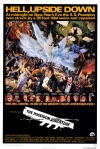
The disaster movie has been having something of an intellectual and artistic renaissance of late.
With Deepwater Horizon‘s script being based almost entirely on transcripts of evidence given during the inquiry into the oil rig disaster and the recently released Sully based on the recollections of the titular pilot who steered US Airways Flight 1549 to a safe ditch on the Hudson River in January 2009, they place fact above fantasy, human solutions over problems and, dare I say it, give a documentary sound and feel to cataclysm cinema.
I’ve argued previously that, while this accounts for better quality films, I hanker after the comparatively cliched scripts (or should that be classic, considering they are the earlier entries in the genre?), soap opera characters and accent on good old crowd pleasing effects, that now look endearingly ropey.
Of all Deepwater’s garish, lovingly crafted 70’s forbears, Poseidon Adventure is the one closest to my celluloid heart. As an inquisitive 12 year old, it was watching this film in my Nan’s kitchen on her tiny TV set, that not only kindled my passion for cinema, but let it burn bright and then chucked a few gallons of paraffin on it, just to make sure it didn’t go out to quick.
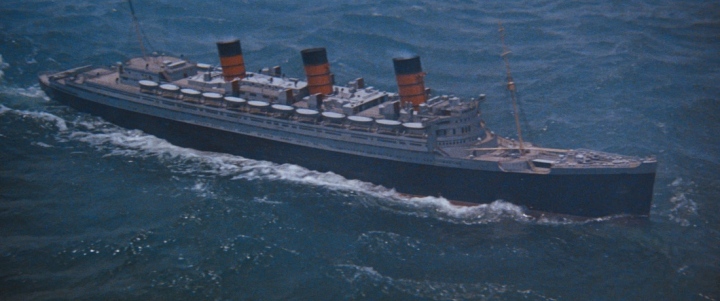
Setting sail in The Poseidon Adventure (1972). The ship was modelled on (and partly filmed aboard) the real-life ocean liner Queen Mary, dry-docked in California.
How did they make hundreds of people flip over to their deaths as the ship turned turtle, I thought, turning my head 90 degrees to the side as the dining salon lurched arse over tit?
I had to find out. So I was straight up to Rugby Library the next day, head buried in film reference books. (For those who want to know, an article in the American Cinematographer journal explains the complicated set-up. Essentially, the dining salon set was built to be raised mechanically, with tilting cameras completing the illusion of disaster).
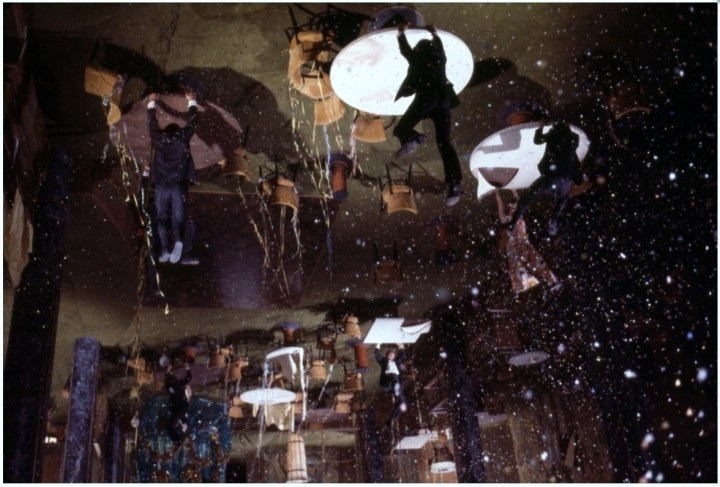
Hanging around for dessert? Passengers in the dining salon find their world suddenly flipped over in The Poseidon Adventure (1972).
I’m certainly not on my own in loving this film, for The Poseidon Adventure has a passionately devoted following of fans all around the world who discuss, debate and disassemble the film with full gusto.
Like me, they would probably agree that its not just the mighty spectacle of TPA (the preferred acronym among the devout) but the smaller details that mark this out as a seventies disaster movie of quality, one in which a bit of heart and soul have seeped into the film stock. For instance:
The camera rolls constantly to ape a ship’s movements and match the creaking, geriatric joints.
The sets are cleverly realized throughout. Not just the ingenious, inverted production design (planned the right way up but in such a way that they could be easily reversed, post-capsize), but also in how they are dressed. The working-class Rogo characters’ messy boudoir and the middle-class Shelby children’s spotless stateroom.
The ‘grand’ dining salon, coloured in gawdy, almost vomitous yellow and green, is more suited to the stage a political campaign of this period than a luxury liner launched in the 1930’s.
This pernickety approach trickles down to the minutae of performances and how the actors were written and directed:
- Red Buttons’ comical, bow-legged speed-walk on deck
- Young Robin Shelby is the ultimate annoying younger brother for a pre-Dynasty Pamela Sue Martin, jumping up and down on her bed before telling her to “shove” her moral guidance (she wants him to get ready so she can see Gene Hackman’s two-fisted priest, whom she has a crush on)
- Stella Stevens raises a toast to love, Hackman’s eyes flicker only momentarily over her admirable cleavage
- Shelley Winters mumbles a Hebrew prayer as she surveys the carnage of the dining room
- Leslie Nielsen has a supporting role as the Captain and audiences of a certain generation will be excused for being disappointed that the sound of a whoopee cushion doesn’t accompany his rather po-faced performance (this was in his pre-Naked Gun, serious actor days).
All of the hard-working actors give salty performances. They are playing stock soap opera types but none the less invest with real feeling and professionalism. Hackman, however, inhabits another level as the two-fisted preacher, punching way above his metaphorical dog collar to almost deliver a performance of prime ham. (Now retired, he rarely, if ever, has spoken about this movie after an alleged spat behind the scenes with producer Irwin Allen about a combover hair-style).
Much has been written about Shelly Winters and her sympathetic (and Oscar-nominated) performance as an overweight former swimming champion. This was at a time in her career when she played such roles with much success. Here, she has the most famous of them and is rewarded with the protracted death scene beloved of Hollywood actresses.
But if f I had to choose the stand out performer, special mention must go to Stella Stevens as the blowsy, inappropriately attired ex-prostitute. She has the best lines and picks them up and rushes out for several touchdowns.
Even the score by John Williams, just before he hit the big time with Steven Spielberg’s Jaws (1975) provides music with perfect, covert cues. A bell chimes ominously in the background as a portent to tragedy, much the same as the Lloyd’s of London bell did whenever a ship insured by them was lost at sea. A trumpet blasts mournfully, as if giving the old liner a ghostly serenade as she sails on her last voyage.
I’ve seen it written in other reviews as to the movie’s religious leanings (a descent into hell for the morally questionable, from which only the good will emerge safe and sound, in the blinking purity of daylight). For an America poised for Watergate, its shady political side its notable (Fred Sadoff’s corporate type compromises passenger safety to save a few bucks)
But the film’s appeal and objectives are simpler. Producer Irwin Allen, the ‘Master of Disaster’, was a canny, impresario type, a king of sub-Cecil B De Mille spectacles who knew exactly what audiences wanted – to see lovely looking objects/sets being blown up/flooded in increasingly thrilling ways and famous actors seen to be put through their paces, all from the safety of their cinema seats.
With TPA and TheTowering Inferno (1974), he did just that and the people turned up in droves (TPA was the biggest grossing film of 1972, rescuing producing studio 20th Century Fox from the financial doldrums).
NB: To note, TPA was such a staple of festive TV programming in the UK, it became a running joke in the Radio Times when it featured in the listings, without fail, almost every Christmas in the 1990’s.
Cast & credits
Director: Ronald Neame. 117mins. 20th century Fox. (PG)
Producer: Irwin Allen.
Writers: Stirling Silliphant, Wendell Mayes.
Camera: Harold E. Stine.
Music: John Williams.
Sets: William Creber.
Gene Hackman, Ernest Borgnine, Red Buttons, Carol Lynley, Roddy McDowall, Stella Stevens, Shelley Winters, Jack Albertson, Pamela Sue Martin, Arthur O’Connell, Eric Shea, Leslie Nielsen.

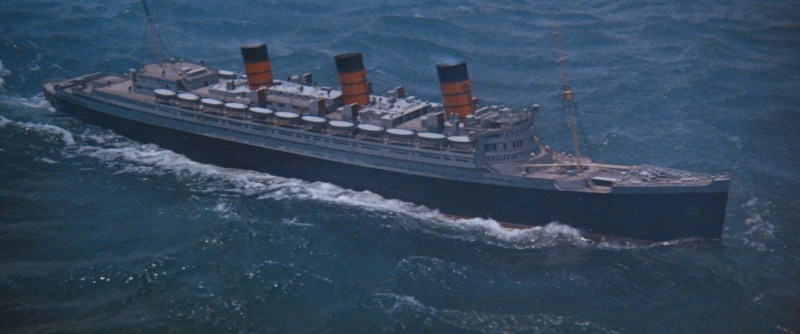

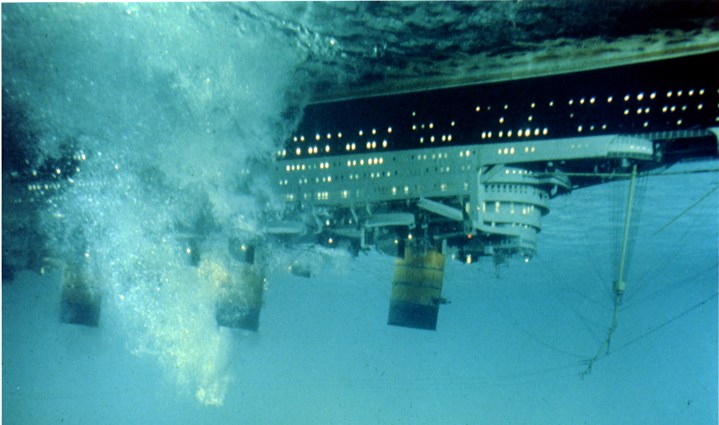
https://www.facebook.com/ThePoseidonAdventure1972/
LikeLike
Excellent review. Your research is appreciated.
The movie continues to be entertaining. Watch it on the big screen whenever possible.
LikeLike
Thank you James…it is a supremely entertaining film. Glad you liked the review.
LikeLike